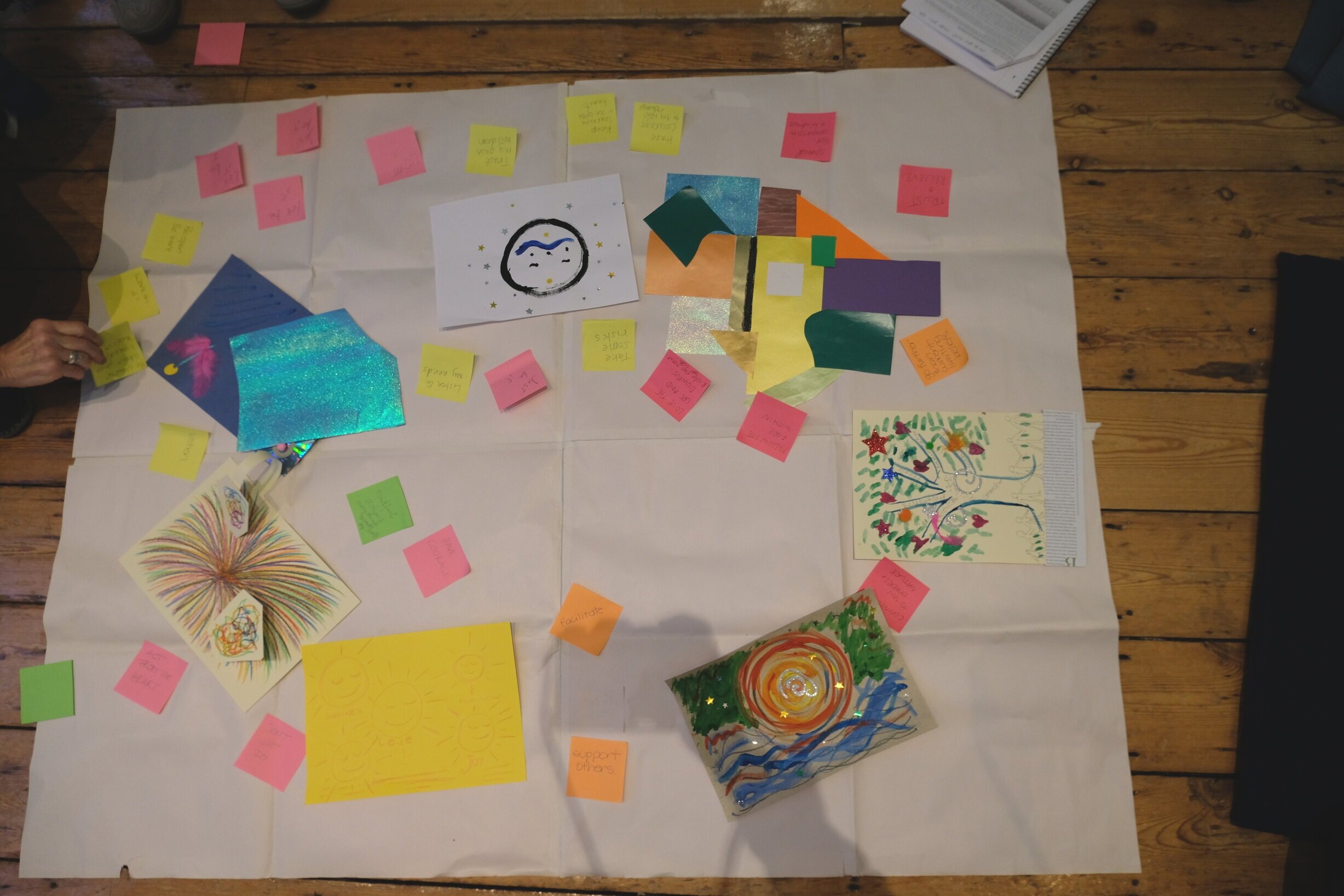Building Inner Strength - 16 Guidelines for Life, London 2020
This was a rare occasion that all the participants in the group were women.
Wendy (Facilitator top right), Zoe (Marketing & Communications FDCW bottom right), Michaela (bottom left) and 16G attendees.
Our Marketing and Communications Manager Zoe participated in the first ‘Building Inner Strength’ 16 Guidelines for life course of 2020 here at the FDCW Headquarters at the Jamyang Buddhist Centre, London. Here are her words to describe her experience:
This weekend I participated in the ‘Building Inner Strength, 16 Guidelines for Life workshop at Jamyang Buddhist Centre. After much anticipation and working with the guidelines over the last 3 months at FDCW I was grateful to have the opportunity to explore the guidelines in greater depth, experience the course first hand and learn the practical tools of how I can apply the guidelines in everyday life.
Having worked through the 30 day online study kit I had some familiarity with what the guidelines were all about but Wendy did an excellent job of inviting us to really unearth what we understood the guidelines to be. It was a stimulating discussion and everyone shared their views, even though the words in the guidelines are so familiar to us in everyday life we don’t really give ourselves the time to think what they really mean so this was an interesting exercise every time as we all had different interpretations and opinions to share.
We worked through the 4 wisdom themes, how we think, how we act, how we relate to others and how we find meaning and explored each of the guidelines within the wisdom theme. We used a number of different tools to help us with our learning throughout the weekend. These included heart-mind meditations, enquiry and exploring a physical representation of the guideline through the body by finding a pose that we felt expressed how the guideline felt in the body. As a yoga teacher I found this as an interesting way of working with the guidelines and it allowed us to connect to the guideline through feeling allowing us to come out of the rational mind and into the body.
It also struck me how Universal the guidelines really are, there are strong parallels between the guidelines and yoga philosophy such as the Yamas & Niyamas. The guideline contentment or “Santosha” in Sanskirt was a clear parallel or “Kindness” or “Ahimsa” often translated as compassion/non violence in Sanskrit shows the similarity between the ethics based practice. The workshop has given me more inspiration to weave in more ethical themes and wisdom into my yoga classes and then invite students to inquire how this guideline feels in asana (postures) of yoga.
I feel there is a lot of pressure in today’s society to ‘BE HAPPY’, social media only shows the highlights of life and it causes there to feelings of inadequcey if we are not living our ‘best lives’ all the time. This course does not sugar coat life or give you a step by step guide to happiness but certainly helps to move away from the myths we have about happiness.
Happiness is not our natural state, we are not meant to be happy all the time.
Happiness is not experiencing positive emotions all the time. Emotions are transient, most fulfilling happiness can be found when we experience a variety of emotions.
There is nothing wrong with you if you are not feeling happy!
These are things I will always remind myself on the days when I am feeling grey.
I particularly enjoyed the art activity where we were invited to express what a fulfilled life meant to us using an artistic medium of our choice. I always loved art as a child and I found this a very therapeutic activity and an interesting tool to see what art flowed from each participant.
What is a fulfilling life to you? An artistic expression by the 16G participants
The key learning I really took from this session was the pre-framing exercise. This involved us thinking of a present problem or situation in our life that may need some guidance and to explain this situation to your partner.
I am planning to lead my first ever yoga retreat so for me just articulating this was a good exercise in itself as putting the idea out there into the world made it a feel a lot more real! My partner then repeated back to me what they understood the situation and the difficulty I was experiencing. This was a really lovely exercise as I felt that my concerns had been truly heard and understood. Listening to this back was very powerful and it felt to good to be giving it space to talk about rather than something I was overthinking or worrying about in my head. This exercise felt empowering as it was an outward expression, I felt like I was taking some action and dealing with it.
We were then invited to pull a 16G card at random and frame our problem or situation with this guideline in mind. The card I selected was ‘Principles’. We were asked to reflect on how we can apply this guideline to our problem or situation.
This really gave me a completely different perspective, I had been so worried about creating an event that was going to please my students and doing things that were perhaps adhering to what I should do, and other people’s principles. I was looking at other teachers and comparing myself, feeling that it would only be successful if I did things a certain way. This card reminded me to come back to my own principles and to create an event that was in keeping with that. So I am grateful for this guideline for reminding me to be true to my inner values and myself.
I will definitely use pre-framing and 16G again, I think it’s a really useful tool to bring into situations to give you a fresh perspective to a problem that you might not have thought of before.
I am extremely grateful to have attended this course and I feel that I learnt a lot in such a short time! If you are looking to find more meaning or purpose in everyday life then this course will give you a framework to help you live a more purposeful existence. It will deepen your understanding of your everyday emotions that will enrich your interactions with others. It’s a truly unique experience and Wendy is a passionate and wonderful facilitator. If you feel the calling to dive deeper then go for it! It’s not to be missed.
BE THE CHANGE YOU WANT TO BE
Kindness to every being - Respect & value each other and the planet - Nor War, Peace & Love - Stop judging. Start Loving - Respect Nature - Challenge Inequality - Open up truth and deal with plastics





